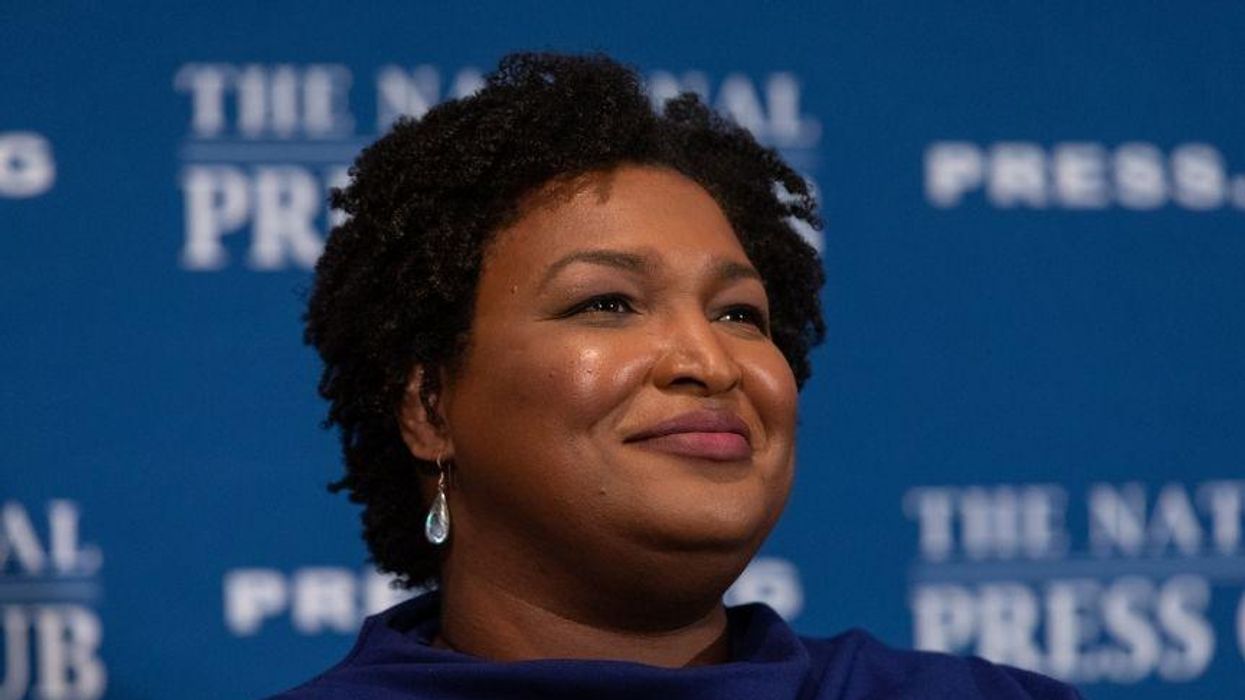Last Wednesday, she made it official: Stacey Abrams, whose legendary organizing and get-out-the-vote skills were instrumental in delivering the Senate to the Democrats in January, announced she is running for governor of Georgia. And while that is very good news for Georgia Democrats, it is also great news for Democrats nationwide, both in 2022 and in 2024.
When Georgia flipped blue in 2020, handing its 16 electoral college votes to Joe Biden, many people were surprised. Stacey Abrams was not one of them. A long-time voting rights advocate, she had been hard at work since narrowly losing the race for governor to Republican Brian Kemp in 2018 in what many saw as a textbook example of voter suppression. Abrams and her Fair Fight coalition pressed tirelessly to register voters, to fight back against voter suppression laws, and turn voters out in force. Georgia already has a 95 percent voter registration rate due to a law granting automatic registration when obtaining a driver’s license, but Abrams and her allies were still able to increase African American registrations by 130,000 people—25% over 2016 levels, the highest of any race, and around 30% higher than new white vote registrations. Much of this growth occurred in the Atlanta metropolitan area, which accounted for more than half of the total registered voters in the state in 2020.
Abrams also understood Georgia’s demographic trends and capitalized on them, putting together a coalition of minority voters including Latinos and Asian Americans. Since 2020, she has been busy organizing at the local level and working with grassroots Democrats, producing eyebrow-raising results that the national media has largely ignored. In Georgia municipal elections held this November, according to a press release by the Democratic Party of Georgia, Democrats flipped 41 seats in 21 counties across Georgia, while Republicans picked up just 6. Abrams knows that, this time around, her shot at the governor’s mansion is stronger than ever.
Her candidacy also will ignite a fire under the Democratic base in just the right place at just the right time. The path for the GOP to retake control of the Senate depends largely upon their hopes of defeating freshman Sen. Raphael Warnock next fall. But with Abrams running, she and Warnock likely will combine forces and form a kind of ticket—a popular new governor and beloved returning senator for the people of Georgia. In an off-year cycle, this boost could prove decisive should African Americans grow particularly energized to cast their votes.
The national implications for Abrams lifting up Warnock can’t be understated. Without a win in Georgia, the GOP’s math becomes increasingly tricky given the other seats they have targeted: They are behind in the polls in Arizona and Nevada, and they haven’t found a candidate in New Hampshire to challenge Sen. Maggie Hassan after Gov. Sununu declined to run against her. Meanwhile, the GOP is defending seats in Pennsylvania, Wisconsin, Ohio, Florida and Missouri where problematic candidates may face established Democratic names. It currently looks tricky for the GOP to pick up two senate seats and hold all of the others without winning Georgia.
Incumbent Georgia Governor Brian Kemp also faces a Trump problem. The former president has railed against him for not cooperating on his bogus election fraud allegations, and Trump has begun to openly back David Perdue, who lost his senate race in the January 2021 run-off to Sen. Jon Ossoff and is considering a primary challenge to Kemp. Trump has warned that his MAGA voters will not turn out for Kemp because of his alleged betrayal of Trump, and that creates a massive risk for Republicans if they want to hold the governorship. A bruising primary between Kemp and Perdue could sap their strength and their coffers long before the match-up with Abrams.
A win by Abrams in 2022 would also help secure a critical block of electoral college votes should a majority of Georgians vote for the Democratic candidate in 2024. Assuming Trump runs again, he will be laser-focused on Georgia, whose results he sought to overturn through infamous calls to the Secretary of State and other election officials, direct pressure upon Kemp, and even a proposed letter (authorized by Jeffrey Clark, whom the January 6 Committee just voted to hold in contempt of Congress) to the Georgia legislature proposing that they could invalidate their slate of electors. With Abrams at the helm, and the ultimate power to certify the state’s presidential election lying with her, the opportunity for these kinds of shenanigans would diminish appreciably.
Moreover, should the Georgia state legislature, controlled by the GOP due to extreme gerrymandering, seek to pass more voter suppression laws following the 2022 elections, they would have to overcome a veto by Abrams if she is governor. This year, we already have seen Democratic governors in other highly gerrymandered swing states such as Michigan and Wisconsin provide the last bulwark against voter suppression laws passed by their GOP-controlled legislatures, underscoring the importance of statewide elected officials in the fight against politically ensconced, gerrymandered legislatures. The same would hold true in Georgia.
For these reasons, many Democrats are cheering yesterday’s announcement and prioritizing Abrams's campaign for support. Donations are already pouring in from around the country. If she wins, Abrams will become not only the first Black governor of Georgia but likely will become the new face—and represent the clear future—of the Democratic Party.
For more political analysis, check out the Status Kuo newsletter.







 @PreetBharara/X
@PreetBharara/X @RepBrendanBoyle/X
@RepBrendanBoyle/X @twesq/Bluesky
@twesq/Bluesky @christopherharris/Bluesky
@christopherharris/Bluesky @evangelinewarren/X
@evangelinewarren/X






 @FrankC164/X
@FrankC164/X
 AMC
AMC